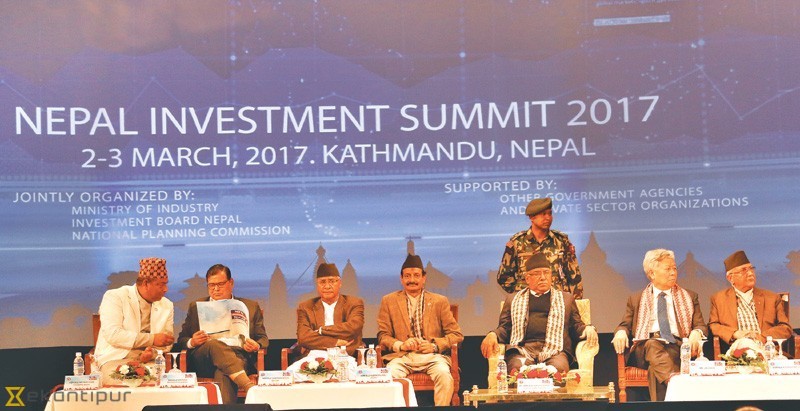[Analytics] Can Nepal’s government translate the hype around the Investment Summit to actual investments?

Only a small fraction of the committed amount trickled in as investment in 2017.
Nepal’s business community is cautiously optimistic about the upcoming mega-summit that the government says will bring hundreds of international investors. As the government is set to roll out the red carpet for international investors in Kathmandu for the Investment Summit, industry observers say the event will be a test for the KP Sharma Oli administration’s ability to translate the hype into actual investments. Bhrikuti Rai specially for the Kathmandu Post.
Earlier this month, the government introduced three pieces of vital legislation to attract foreign investors, including the much talked about Foreign Investment and Technology Transfer Act that promises FDI approval within a week and a one-stop service at the Ministry of Industry.
During the last investment summit in 2017, the government signed letters of intent with foreign investors for investments worth a combined $13.50 billion. But only a small fraction of that amount trickled in as actual investments. Members from Nepal’s business community cite the lack of follow up and urgency from the government post-summit and the continuing bureaucratic red tape for the lacklustre situation after the first summit which ended on a high note.
Experts say it would instead help if the government would move beyond the initial interest and take a proactive role to woo the investors to actually making commitments, something that didn’t happen the last time.
“The government should hold an elaborate discussion with parties who show interest in certain projects, explaining how they will move forward to sustain the interest and translate them to actual investments,” said Advocate Semanta Dahal, who has advised the government on different infrastructure projects.
The summit in 2017 came at a time when Nepal had passed its constitution after a prolonged impasse and was getting ready for the historic local elections taking place after two decades. The key message then was to tell the world that Nepal was open for business.
The summit this year, with the recently passed legislation to attract foreign investments, aims to double down on the same message in front of a much larger audience. According to the Nepal Investment Board, there will be delegates from around 50 countries compared to the participation of only 21 countries in the 2017 summit. Speaking to the Post earlier this month, Maha Prasad Adhikari, the CEO of Nepal Investment Board said, “Our pitch will be political stability, policy predictability and reforms. The state agencies will facilitate investors in an efficient and effective manner without bureaucratic hurdles and red-tapism.”
But some industry insiders say the preparations for the summit don’t show the government doing enough homework to implement the lessons learnt from the last summit.
“There isn’t much difference in the preparation for the summit from the last time except on the reaching out front, which was extensive,” said Siddhant Pandey of Business Oxygen, Nepal’s first private equity firm. In the last couple of months, ministers and government officials have dashed off to London, New Delhi, Beijing and several other places in an attempt to raise the profile of the Investment Summit and bring in more participants.
But unless the ease of doing business improves in Nepal, the hype surrounding FDI will die down after the end of the two-day glitz, some business owners say. Nepal slipped five places from 105 in 2017 to 110 in 2018 in ease of doing business global ranking prepared by the World Bank. During the same time, India had leapfrogged from 130 to 77 in the ranking. Getting approvals from multiple government bodies and long waiting time to get the process started for investments, in addition to the high cost of doing business, have routinely been cited as obstacles to investments in Nepal.
In 2017, then-industry minister Nabindra Raj Joshi seemed admirably optimistic when he told the Post, that the Investment Summit was “the beginning of glorious days for Nepal”. But two years since that remark, Nepal is still far from fostering a favourable investment climate and paving the way for foreign investors to easily enter and exit the country, something Joshi had said the government would work towards.
“The entry and exit of investment isn’t efficient in Nepal yet,” said Willem Grimminck of One to Watch, an investment management company that invests in small and medium businesses. But Grimminck said he is hopeful that things will change with the government’s recent decisions to pass legislation to attract foreign investments.
“The investment summit will be a good test to see whether the government succeeds and how the investors respond to the reforms the government has undertaken,” he added.
While the government tries to woo international investors, local businessmen say there should be sustained efforts to foster a favourable climate for business for all, and that they should also be given the same kind of treatment for ease of business.
“We can’t have an uneven playing field,” said Shekhar Golchha, senior vice president of the Federation of Nepalese Chambers of Commerce and Industry. “Addressing all the concerns which dampen the investment fervour in the country should be an ongoing exercise after the summit as well.”